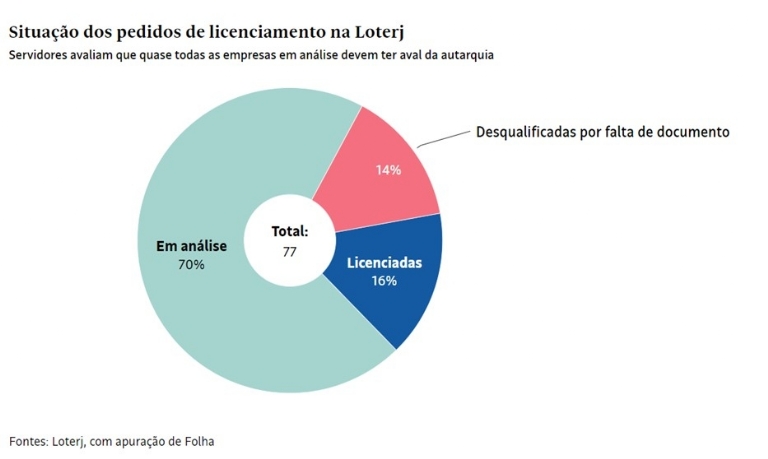

The government's attempt to expedite the process of regulating the betting market has revealed gaps in the framework designed by Congress, endorsed by the Ministry of Finance. Even before the regulated market begins to operate officially on January 1, betting companies have already overturned decisions by the Secretariat of Prizes and Betting (SPA) through appeals in states, in courts, and by purchasing licensed companies.
The clearest consequence of this has been the surge in license applications at the Rio de Janeiro State Lottery (Loterj). By September 17, when the government announced it would block sites this month that had not requested federal permission or obtained a state license, there were 20 betting companies waiting for approval in the state. This number rose to 77 by last Friday (18).

The Rio lottery is moving to establish itself as a national alternative for licensing betting companies, under government scrutiny. The Attorney General’s Office (AGU) has gone to court to limit Loterj's operations to the state of Rio de Janeiro.
On August 1, Loterj secured an injunction from the Federal Court of the Federal District allowing it to operate nationwide. On the 5th, the government managed to overturn this decision. However, the Rio state agency claims it continues to process bets in Rio de Janeiro, thus operating within the law.
The outcome of the legal battle between the Union, Loterj, and the betting companies, according to lawyers consulted by Folha, will define how the rules will actually work. These rules have been chosen by the Ministry of Finance as the main tool in combating money laundering, addiction, and abusive advertising related to betting.
The AGU stated that it will only comment on the matter within the case proceedings. In court documents, the agency mentions the risk of predatory competition between federal entities to host betting sites if the Union loses the dispute with the Rio state company. In such a scenario, entities would be incentivized to pass more lenient laws and regulations regarding financial crimes to attract betting companies.
For example, the Rio state lottery does not require “clean record” certificates from everyone involved in the betting sites' ownership structures.
The federal government, on the other hand, demands documentation from all individuals linked to the companies that wish to obtain a license. It also requires a detailed business plan with financial projections and specific accounting statements.
During an event organized by the Lide group, led by João Doria, last Friday, Loterj president Hazenclever Lopes Cançado said that Loterj is already receiving license requests from companies in various states and even from abroad. For this reason, it will fight to ensure that licensed companies can serve players nationwide, processing bets in Rio de Janeiro.
“It’s the same logic as e-commerce, where tax collection occurs in the state where the seller is located,” Cançado told Folha. The Rio state lottery license would have global validity, similar to authorizations from Malta, Curaçao, and Anjouan, used in Europe to circumvent national regulations.
The federal government, on the other hand, argues that the law requires a georeferencing system to track the origin of bets to prevent money laundering. This technology, adopted in Paraná and Maranhão, would restrict the operation of licensed betting companies to their respective territories, as defined by Law No. 14,790 of 2023.
Cançado counters that the Supreme Federal Court (STF), in ruling on three cases, guaranteed states the right to compete with the Union, even in regulatory matters. He believes that the government’s actions against the Rio agency aim to concentrate betting revenue, continuing the historical monopoly on gambling by the Caixa Econômica Federal.
In the industry, however, the prevailing view is that there is a difference in approach between the Ministry of Finance and Loterj.
Industry leaders estimate that of the more than 200 companies that have applied for permission to operate in the betting market, only one or two dozen will be able to comply with federal rules and remain competitive in the long term.
The Rio state lottery, on the other hand, is expected to license more than 50 companies, operating in a less complex environment and more inclined to leave criminal matters to law enforcement. Loterj staff privately say that their superiors’ guidance is to approve applications as long as minimum requirements are met—11 companies have so far failed to submit the necessary paperwork, and 12 have already been granted permission.
The Ministry of Finance states that the issuance of licenses and subsequent oversight in each state is the responsibility of the local authority.
In a third front of judicial conflict for the Union, various sectors of the economy are trying to invalidate the law that regulated the betting market in a case before the STF. This alone would not render betting companies illegal.
The AGU warned, in a petition addressed to the minister responsible for the case, Luiz Fux, of the risk that Brazil could remain a base for the current gray market in betting if the STF upholds the National Confederation of Commerce’s request to invalidate the regulation.
The proper course, according to the institution, would be to overturn the law signed by Michel Temer that legalized betting platforms at the end of 2018.
Source: Folha